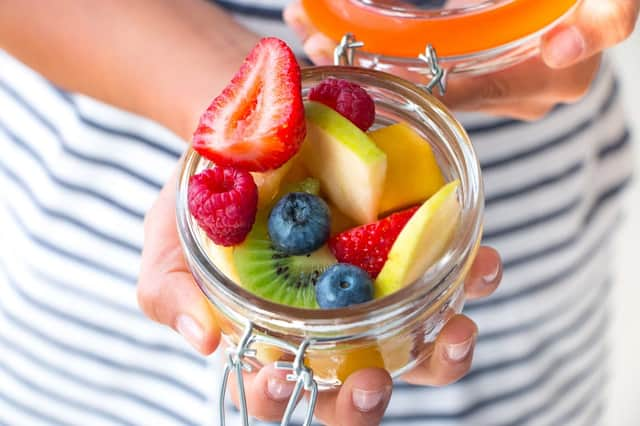Here are some tips on how to eat for optimal health during lockdown


As the pandemic and lockdown continues, many people have embarked on a fitness kick.
Recently, forgotten bicycles, running shoes and home workout videos have all been dusted off in order to pass the time during lockdown.
Advertisement
Hide AdAdvertisement
Hide AdHowever, as every health professional will tell you, while it's great to stay fit, exercise is only one part of a true healthy lifestyle.
Eating healthy plays a crucial part in feeling your best and protecting yourself against illnesses.
So, even if you have spent the last few weeks with your hand perpetually in the biscuit tin, there’s no time like the present to begin eating healthy. Here are our top tips to help you on your healthy eating journey.
Healthy snacking
Habitual grazers will be glad to learn that you can still snack frequently and live a healthy life, so long as the snacks at hand are low calorie alternatives.
Advertisement
Hide AdAdvertisement
Hide AdTry swapping your usual high sugar or high fat snacks for treats such as yoghurts, nuts and seeds, or fruit.
Additionally, you can always swap high calorie chocolate bars for the healthier option of dark chocolate with a reduced portion, such as two squares.
Increase your vitamin D intake
Vitamin D is vital for maintaining healthy bones, teeth and muscles, as well as supporting the immune system.
A lack of vitamin D causes a condition called osteomalacia in adults, and rickets in developing children.
Advertisement
Hide AdAdvertisement
Hide AdExperts suggest a mere 15 minutes in direct sunlight is all the majority of people need in order to obtain a required amount of vitamin D.
However, Public Health England (PHE) recently advised that the average person should take 10 micrograms of vitamin D supplements during lockdown, as most people won’t necessarily be getting enough sun exposure during this time.
Plan ahead
Thinking of meals to make at home can become a laborious task during lockdown. Now that restaurants and cafes have closed, we all have less inspiration than usual.
Instead of leaving thoughts of meal times to the last minute - which can leave you reaching for unhealthy snacks to solve the problem - try to plan ahead.
Advertisement
Hide AdAdvertisement
Hide AdMake a menu for the week ahead before you go shopping, ensuring to include as many healthy meals and snacks as possible on your shopping list, while cutting the unhealthy options.
Before the start of the week, try to prepare the week's upcoming meals in advance, or, at the very least, decide upon a meal you will cook for each upcoming night.
Freeze your food
Meal prepping and freezing your food go hand in hand.
When you are feeling particularly tired and just can't face cooking your evening meal, instead of calling your local takeaway to save the day, it is better to reheat one of the pre-prepared meals from your freezer.
Takeaways are notoriously unhealthy options. Using frozen leftovers from previous healthy meals not only ensures you get plenty of nutrients, but it also reduces food waste and saves you some money. It's a win-win all round.
Advertisement
Hide AdAdvertisement
Hide AdMeals such as chilli, curry, stews and soups tend to freeze well, as do fruits like berries and bananas, which can be used for smoothies to accompany your meal or as a healthy snack.
Load up on nutrients
The key to a healthy diet is always variety, as this will help ensure you get as many nutrients as possible.
To help keep yourself healthy and protect yourself from coronavirus, it is important to get nutrients that help to boost your immune system. Such nutrients include vitamin A, vitamin C and zinc.
Vitamin A can be found in spinach and sweet potato, while vitamin C can be found in oranges, tomatoes, peppers and berries.
Advertisement
Hide AdAdvertisement
Hide AdZinc is found in shellfish and meat, as well as dairy and bread.
Eat oily fish
Oily fish is rich in omega-3 which numerous studies have found to help improve mental health and mental functions. Oily fish such as anchovies are also known to lower levels of triglycerides and cholesterol in the blood.
Not only is oily fish good for your brain, it is also a very rich source of vitamin D.
Stay hydrated
Drinking sufficient amounts of water is crucial for your body to be able to fulfil its necessary functions in keeping you alive and healthy.
Advertisement
Hide AdAdvertisement
Hide AdThe NHS advises you to drink six to eight glasses - about 1.2 litres of water - every day.
However, as long as you drink enough fluid it doesn’t necessarily just have to be water. Alternatives such as tea, coffee and milk or juice can help to keep you optimally hydrated.
On top of this, staying hydrated isn't just good for your physical health it is known to be great for your mental health too.
Balance is key
While being healthy does require you to be responsible, and at times a little regimented in order to maintain a routine, it's important to remember that you can always indulge every now and again.
Advertisement
Hide AdAdvertisement
Hide AdTreating yourself will help give you a little mood boost when you need it, while also stopping you from breaking your healthy habits for good.
Lockdown has already restricted our lives, so occasionally throwing out the ‘rulebook’ will ensure you make it out of lockdown not only healthy, but happy, and ready to take on the world.